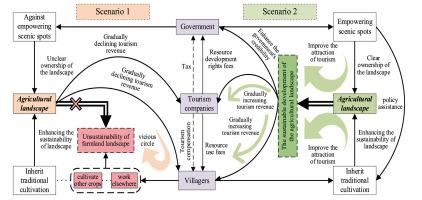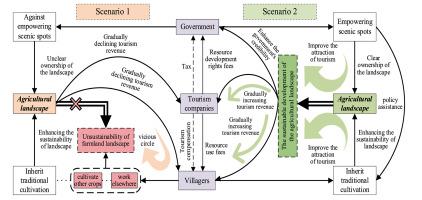Empowering agricultural landscapes: A game-based simulation for establishing tourism attractions property rights in farmland
IF 10
1区 环境科学与生态学
Q1 ENGINEERING, ENVIRONMENTAL
引用次数: 0
Abstract
This study focuses on Longji Terrace, a renowned agricultural heritage tourism destination in Longsheng County, Guangxi Zhuang Autonomous Region in China, and explores the cooperative dynamics among the government, tourism enterprises and local villagers around the issue of empowering rural landscapes. Based on the simulation of field investigation and network retrieval data, this paper examines how the initial intentions of the three players, along with resource costs and tourism compensation, shape cooperative strategies across different scenarios. The findings indicate that (1) an enhanced government's willingness to cooperate facilitates the evolution of tourism enterprises and villagers toward collaboration. (2) Equally essential is the establishment of reasonable resource development fee to expedite the adoption of cooperative strategies. (3) Tourism compensation significantly influences the strategic decisions of villagers, who demonstrate sensitivity to compensation provided by tourism companies. And (4), by empowering agricultural landscapes, the cycle of labor outflow and farmland abandonment can be disrupted, resulting in a mutually beneficial outcome for all three parties involved. To promote rural revitalization and protect agricultural landscapes, the government should establish a clear ownership framework for tourist attractions, set reasonable pricing structures for resource development and utilization fees, and prioritize the rights and interests of villagers to enhance their willingness to cooperate and participate in rural tourism development.


赋能农业景观:一个基于游戏的模拟,用于在农田中建立旅游景点的产权
本研究以中国广西壮族自治区龙胜县著名农业文化遗产旅游目的地龙基梯田为研究对象,探讨政府、旅游企业和当地村民围绕乡村景观赋权问题的合作动态。基于实地调查和网络检索数据的模拟,本文考察了三个参与者的初始意图,以及资源成本和旅游补偿如何影响不同场景下的合作策略。研究发现:(1)政府合作意愿的增强促进了旅游企业和村民向合作方向演进。(2)同样重要的是建立合理的资源开发费,以加快采取合作战略。(3)旅游补偿显著影响村民的战略决策,村民对旅游公司提供的补偿表现出敏感性。(4)通过赋予农业景观权力,可以打破劳动力外流和农田放弃的循环,从而为所有相关各方带来互利的结果。为推进乡村振兴,保护农业景观,政府应建立明确的旅游景点所有权框架,制定合理的资源开发和使用费定价结构,优先考虑村民的权益,增强他们对乡村旅游开发的合作和参与意愿。
本文章由计算机程序翻译,如有差异,请以英文原文为准。
求助全文
约1分钟内获得全文
求助全文
来源期刊

Journal of Cleaner Production
环境科学-工程:环境
CiteScore
20.40
自引率
9.00%
发文量
4720
审稿时长
111 days
期刊介绍:
The Journal of Cleaner Production is an international, transdisciplinary journal that addresses and discusses theoretical and practical Cleaner Production, Environmental, and Sustainability issues. It aims to help societies become more sustainable by focusing on the concept of 'Cleaner Production', which aims at preventing waste production and increasing efficiencies in energy, water, resources, and human capital use. The journal serves as a platform for corporations, governments, education institutions, regions, and societies to engage in discussions and research related to Cleaner Production, environmental, and sustainability practices.
 求助内容:
求助内容: 应助结果提醒方式:
应助结果提醒方式:


